|
Villagers resettled in 14 Grama Niladari divisions:
Life springs back to normal in Musali
by Dhaneshi YATAWARA in Musali
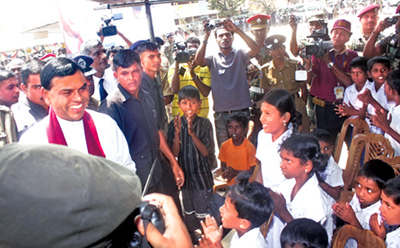
Chairman of the Presidential Task Force on Northern Development
Senior Presidential Advisor, Basil Rajapaksa M.P. speaks to IDPs.
|
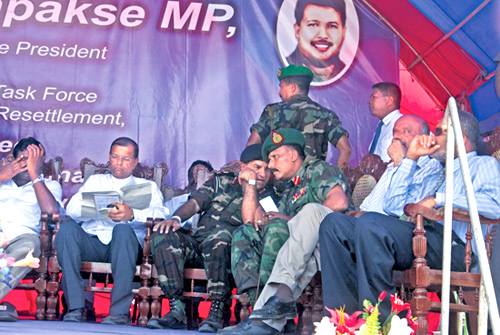
Northern Province Governor Maj. Gen. G.A. Chandrasiri, Army
Commander Lt. Gen. Jagath Jayasuriya, Wanni Security Forces
Commander Maj. Gen. Kamal Gunarathne and prominent Tamil
political leaders at the commencement of the resettlement
program. |
| * The most cherished asset you have today is your children, who you
have sheltered as best as you could. This is the time to ensure that
your children are guided by you to benefit from the new facilities that
are being provided for them and ensure that they are never allowed again
to be misled by false prophets or saviours. Together you can build a new
life and look to benefit from the many opportunities that will be
available in the tranquillity of peace and friendship.
* President Mahinda Rajapaksa in his letter to each IDP family.
|
Hilda Sriyani was happy to be in her own house in her village. A
descendent from Negombo, Hilda married Joseph Mariyadas in 1979 and
settled down in Kundachchikuda in Mannar. “Life is hundred times better
than what it used to be”, she said.
Hilda, her husband and son is resettled in Kundachchikuda for the
fourth and the last time including 97 families of this small village in
one of the remotest parts of the Musali DS Division in Mannar.
“We lived in fear. Since I’m a Sinhalese the LTTE was suspicious
about us and right throughout we were harassed. We were displaced four
times and have stayed in Kalpitiya, Thalawila and Pitipana refugee camps
and then settled in a welfare camp in Nanattan and that was on September
1, 2007,” she said.
Torture
Life was hard for people for the past two decades and it is only now
that they enjoy freedom. “Those were the worst days in my life,” said
Anton Vijey (27). Because his mother, Hilda Sriyani, was Sinhala he was
constantly suspected. “I couldn’t talk to my friends or neighbours at
leisure. The LTTE would drag me away and beat me,” Anton said. “Once I
was beaten under a Holy Cross in my village and on another occasion they
tide me to a lamp post and beat me with palmyrah branches until I bleed
badly,” he said recalling those gruesome moments.
No one in the village could protect me. My parents were helpless,” he
said. “Life is totally different now with freedom and a sense of
security. We have the freedom to build our future. That is all what we
wanted,” Anton added.
No income
“Those days the fishing mudalalis were not allowed to buy our catch.
The LTTE tells us where to go and sell our fish”, said Paramanandan, a
fisherman in Kundachchikuda.
Most of the villagers are fishermen and farmers. During the rainy
season from October to March, paddy is cultivated and during the rest of
the year they go fishing. This was their traditional lifestyle for
generations.
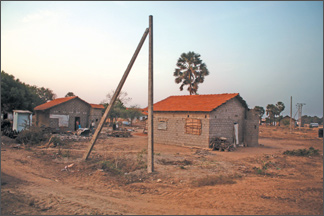 |
| Reawakening
Kundachchikuda village |
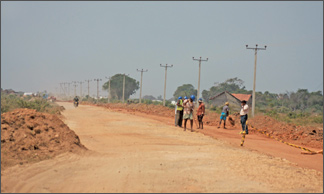 |
| The access
road to resettled villages, under repair |
Paramanandan said the LTTE always demanded a part of the catch and
often the best.
“We were not allowed to go to the sea as we wanted. We couldn’t go
fishing daily during the season,” he added. We had to face the same
situation when we cultivated paddy. Either they would restrict our
activities or take our harvest forcibly. We did not have enough food or
money to survive,” he said.
Nearly 150 - 200 fishermen who were residents of this village will be
coming here to do their job and with time they will permanently settle
in the village. “This is our home, the place where we were born and
bred, said 34-year-old J.M. Naizer, a fisherman of Kundachchikuda now
living in Puttlam after the displacement. He travels from Puttlam to
Kundachchikuda for his business and he intends to return to this
village.
Saving youth
The difference between Arippu and Kundachchikuda is that Arippu had
more government officers, teachers,clerks etc. The two villages are
returning to normalcy.
P. Emanuel Crooz, the Principal of the Manarippu Roman Catholic Tamil
Mixed School, seems to be the happiest man in Arippu. He is free and
does his duty.
“When everything was under LTTE control, we had to give the school
hall to the Tigers for their meetings. This disturbed the education of
children.
We had no say. I never thought we would be relieved from this
situations and will be able to live freely”, he said.
“To protect the children from conscription I had to send them to
schools in Mannar. LTTE would drag children and the school was an ideal
place for their recruitment.
I faced many risks but I see those children are now safe. It gives me
comfort and satisfaction as the best thing I ever did during my career,”
said a retired principal.
Normalcy
Lives are returning to normal following the liberation from the
clutches of the LTTE.
|
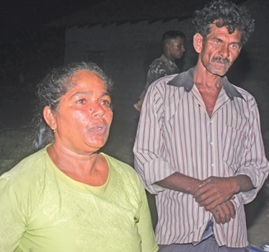
Hilda Sriyani and her husband |
|
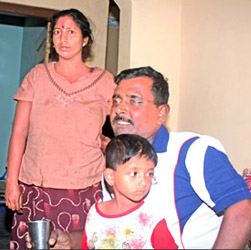
Principal Emanuel Crooz with his family |
People speak about all the good done by the soldiers and sailors with
great appreciation.Now people could continue with their livelihood as
infrastructure development is taking place.
Chairman of the Presidential Task Force on Northern Development
Senior Presidential Advisor, Basil Rajapaksa M.P. spoke to some of the
IDPs who returned home on October 22.
The former strongholds of the LTTE - Mullaitivu and Kilinochchi
Districts - are among the areas in which the internally displaced Tamils
of North will be resettled under resettlement program of the Government.
The resettlement of a total 41,685 persons from 12,095 families will
take place in the current phase of resettlement which started last week.
A total of 41,685 Internally Displaced Persons of 12,095 families were
resettled in Kilinochchi, Mannar and Vavuniya.
Around 583 families were resettled in the Vavuniya district while
6,631 persons from 2,644 families were resettled in the Mannar district.
And 16,394 persons of 4,415 families resettled in Mullaitivu district
and 10,017 persons of 2,453 in the Kilinochchi district.
With the de-mining process progresses with the Government’s initial
plan is to resettle at least 70% of the Internally Displaced Persons
within the 180-day development program.
|

